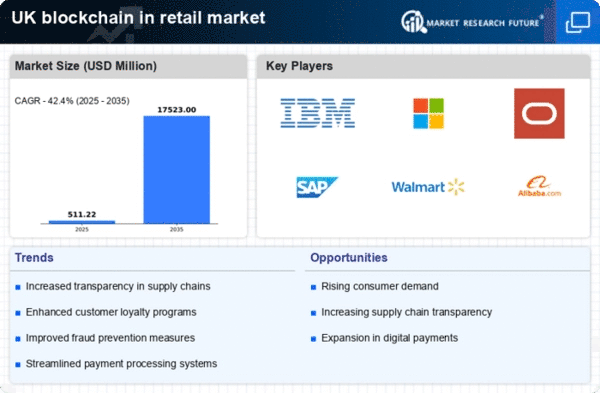Enhanced Security and Fraud Prevention
Security concerns remain a critical issue in the retail sector, particularly regarding payment systems and customer data protection. The blockchain in-retail market offers robust security features that can mitigate risks associated with fraud and data breaches. By utilizing cryptographic techniques, blockchain ensures that transactions are secure and tamper-proof. A study indicates that retailers adopting blockchain technology can reduce fraud-related losses by as much as 50%. This enhanced security not only protects retailers but also instills confidence in consumers, thereby promoting the adoption of blockchain solutions in the retail industry.
Integration with Emerging Technologies
The blockchain market is increasingly being integrated with other emerging technologies such as artificial intelligence (AI) and the Internet of Things (IoT). This convergence allows for more sophisticated data analytics and real-time tracking of inventory and customer preferences. For instance, retailers can leverage AI algorithms to analyze blockchain data, leading to improved decision-making and personalized customer experiences. The potential for synergy between these technologies suggests a transformative impact on the retail landscape, driving further investment and innovation within the blockchain in-retail market.
Increased Consumer Demand for Transparency
The blockchain market is experiencing a notable surge in consumer demand for transparency regarding product origins and supply chain processes. As consumers become more conscious of ethical sourcing and sustainability, retailers are compelled to adopt blockchain technology to provide verifiable information about their products. This shift is evidenced by a survey indicating that approximately 73% of UK consumers are willing to pay more for products that offer transparency in sourcing. Consequently, retailers integrating blockchain solutions can enhance their brand reputation and foster customer loyalty, thereby driving growth in the blockchain in-retail market.
Regulatory Support and Framework Development
The regulatory environment surrounding blockchain technology is evolving, with UK authorities actively exploring frameworks to support its adoption in the retail sector. This regulatory support is crucial for fostering innovation and ensuring compliance with existing laws. The UK government has initiated discussions on creating guidelines that facilitate the safe use of blockchain while protecting consumer rights. As regulatory clarity improves, retailers are likely to feel more confident in investing in blockchain solutions, thereby propelling growth in the blockchain in-retail market. This supportive environment may also attract new entrants, further diversifying the market.
Cost Reduction through Operational Efficiency
The implementation of blockchain technology in the retail sector is poised to significantly reduce operational costs. By automating processes such as inventory management and payment reconciliation, retailers can minimize human error and streamline operations. Reports suggest that businesses utilizing blockchain can achieve cost savings of up to 30% in supply chain management. This efficiency not only enhances profitability but also allows retailers to allocate resources more effectively, thereby stimulating further investment in the blockchain in-retail market. As operational costs decrease, the attractiveness of blockchain solutions increases for retailers seeking competitive advantages.
















